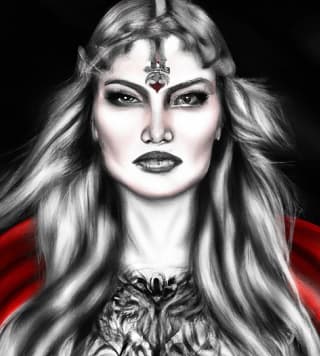Frigg - Goddess of Norse Mythology

Frigg, the goddess of marriage, motherhood, and destiny in Norse mythology. Often depicted as a wise and powerful queen.
Frigg (pronounced: "freeg") also known as Friggja, Frea, or Fricka, is a goddess in Norse mythology and the queen of the Æsir pantheon. She is the wife of Odin, the god of war and wisdom, and the mother of Baldr and Höðr.
The name "Frigg" in Old Norse runes is written as:
ᚠᚱᛁᚷᚷ
Frigg is known as the goddess of love, marriage, motherhood, and prophecy. She is also associated with fertility, household management, healing, and death. According to legend, she was the only woman allowed to sit on Hlidskjalf, a watchtower from which she advised her husband on important matters.
Frigg's home in Ásgard, named Fensalir, was where she spent her days spinning clouds, a task she is often depicted doing with a spinning wheel. She is also considered the patron saint of sibyls, soothsayers, and fairies.
One of Frigg's most notable qualities was her prescience. She was reputed to know the destiny of each individual but never revealed it. As such, she was considered the patroness of women and farmers, and was called upon to facilitate the transition between life and death for the dying.
Despite her devotion to her family and husband, Frigg harbored an all-consuming passion for gold. One myth tells of her jealousy over a golden statue in the likeness of Odin, which she convinced one of her servants to destroy and recover the gold to make jewelry.
Scholars have debated whether Frigg and the goddess Freyja are two forms of the same deity. Both goddesses are associated with love, fertility, and childbirth, and both love jewelry. However, Freyja is considered a High Goddess in the Vanir group, while Frigg is her counterpart in the Æsir group.
Frigg is often depicted with her twelve servants, who helped her carry out her duties. Each of the servants had a well-defined role, such as carrying Frigg's orders across the nine realms on the back of her horse or protecting individuals deemed worthy of keeping from harm.
In modern times, Frigg continues to appear in Scandinavian and Germanic folklore, often in expressions and idioms. Her legacy as a powerful goddess of love, prophecy, and fertility lives on in Norse mythology and beyond.
Please note that the information provided about Frigg and Norse mythology is complex and may be subject to interpretation and debate. The myths and stories of Norse mythology have evolved and been passed down through oral tradition and written accounts, and there may be variations in the way they are told and understood. This information should be used as a general reference and not as a definitive source on the subject.
If you notice an error on this web page, please email us at contact@historylists.org and let us know about it. Please be sure to include a brief description of the mistake you have noticed, along with the location of the mistake on the web page (e.g., the specific section or paragraph where it appears). We appreciate your help in keeping our website accurate and will use the information you provide to make necessary updates as soon as possible. Thank you for your assistance!
Other Norse Gods and Goddesses
- Baldr (Æsir) - God of Light, Beauty, and Goodness.
- Beyla (Æsir) - Goddess of Agriculture.
- Borr (Æsir) - Father of the Norse Gods.
- Bragi (Æsir) - God of Poetry and Song.
- Byggvir (Vanir) - God of Agriculture.
- Dagr (Æsir) - God of Day.
- Dellingr (Æsir) - God of the Dawn.
- Eir (Ásynjur) - Goddess of Healing and Protector.
- Forseti (Æsir) - God of Justice and Reconciliation.
- Freyja (Vanir) - God of Love, Fertility, War, and death.
- Freyr (Vanir) - God of Fertility and Prosperity.
- Frigg (Ásynjur) - Queen of the Gods.
- Fulla (Ásynjur) - Goddess of Fertility.
- Gefjon (Ásynjur) - Goddess of Fertility.
- Gná (Ásynjur) - Messenger of the Gods.
- Gullveig (Vanir) - Goddess of Witchcraft and Sorcery.
- Heimdall (Æsir) - Watchman of the Gods.
- Hel (Æsir) - Goddess of the Underworld.
- Hermóðr (Æsir) - Messenger of the Gods.
- Hlín (Ásynjur) - Goddess of Protection.
- Höðr (Æsir) - God of Darkness.
- Hœnir (Æsir) - God of Creation.
- Iðunn (Ásynjur) - Goddess of Immortality.
- Jörd (Ásynjur) - Goddess of the Earth.
- Kvasir (Vanir) - God of Wisdom.
- Lóðurr (Æsir) - God of Creation.
- Lofn (Ásynjur) - Goddess of Love.
- Loki (Æsir) - God of Mischief and Deception.
- Magni (Æsir) - God of Strength.
- Modi (Æsir) - God of Courage.
- Mimir (Æsir) - God of Wisdom.
- Nanna (Ásynjur) - Goddess of Love and Devotion.
- Njörðr (Vanir) - God of the Sea and Fertility.
- Nótt (Æsir) - Goddess of the Night and Dreams.
- Odin (Æsir) - God of Creation and King of the Gods.
- Óðr (Vanir) - God of Divine Madness, Poetry, and Long Journeys.
- Rán (Ásynjur) - Goddess of the Sea and Death.
- Sága (Ásynjur) - Goddess of Wisdom.
- Sif (Ásynjur) - Goddess of Abundance.
- Sigyn (Ásynjur) - Goddess of Loyalty.
- Sjöfn (Ásynjur) - Goddess of Love.
- Skaði (Ásynjur) - Goddess of Hunting, Skiing, and Winter.
- Snotra (Ásynjur) - Goddess of Wisdom.
- Sól (Ásynjur) - Goddess of the Sun.
- Thor (Æsir) - God of Lightning and Protection.
- Týr (Æsir) - God of War and Justice.
- Ullr (Æsir) - God of Skiing, Archery, and the Hunt.
- Váli (Æsir) - God of Revenge.
- Vár (Ásynjur) - Goddess of Oaths and Agreements.
- Vé (Æsir) - God of Creation.
- Víðarr (Æsir) - God of Vengeance.
- Vili (Æsir) - God of Creation.